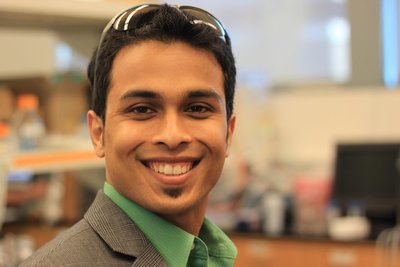 Sunny Shah
Sunny Shah
In March of 2016 Sunny Shah, Assistant Director and Faculty of the ESTEEM Graduate Program at the University of Notre Dame, was interviewed by Steve Blank about his journey to entrepreneurship. Like most students in ESTEEM, I have spent a lot of time discussing my thesis project, coursework, and my job search with Sunny. However, these topics were the extent of those quick meetings. Through listening to the interview I found out more about his background and how he got involved with ESTEEM.
This journey started in India’s largest city, Mumbai, where Sunny spent the first eighteen years of his life. His father was an engineer and his brother was a physician. Sunny, seemingly not wanting to disappoint either, went on to study biomedical engineering at UC Davis. There he would go on to receive his PhD in biomedical engineering. For his doctoral work, he focused on liver tissue engineering and stem cell differentiation. Sunny became a senior scientist at Notre Dame in 2011 developing diagnostic tools that could find use in the medical, food and environmental fields. His lab created a low cost, robust diagnostic tool for detecting pathogens through specific DNA and RNA signatures.
Although Sunny enjoyed the science behind his research, he was always curious to the marketability of the product. How a product will fair in the market is the most important factor in determining the success of the product. “It’s great what you (the scientist) think, but you aren’t the one buying it.”He decided to then pursue and complete a NSF funded development program called I-Corps, which provided a boot camp in product commercialization. Convinced that the consumer would want his product he apprehensively went through the program’s first requirement of 100 customer interviews within a six week period. This was done to see if there was an actual need for the product. He says this “brought (him) out of (his) comfort zone.” He truly had to get out of the building and go talk to potential users of his diagnostic tools. He decided to look specifically at the food industry and went to a number of meat and dairy processing plants. After six weeks of interviews the I-Corps teams reconvened in Washington D.C. to present their findings. Sunny’s team ended up invalidating their product for the food industry. He said that although there was a need for faster diagnostic tools his device would not fulfill this need. It is important to recognize that the creator of a product will have bias. Says Sunny, “You have to be OK with failures… maybe my assumption was wrong.”
This led to a “pivot” in the way that Sunny thought about product creation, where listening to people and trying to find their pain points can stimulate innovation – a process that ESTEEM has wholeheartedly adopted. Sunny preaches this message as someone who has gone through the process and understands some of the difficulties associated with it. He says that this process is not dissimilar to the scientific method, where you have a hypothesis, test it, accept or reject the original hypothesis, make some edits and then share your results. Instead of hypothesis driven scientific research this is hypothesis driven market research.